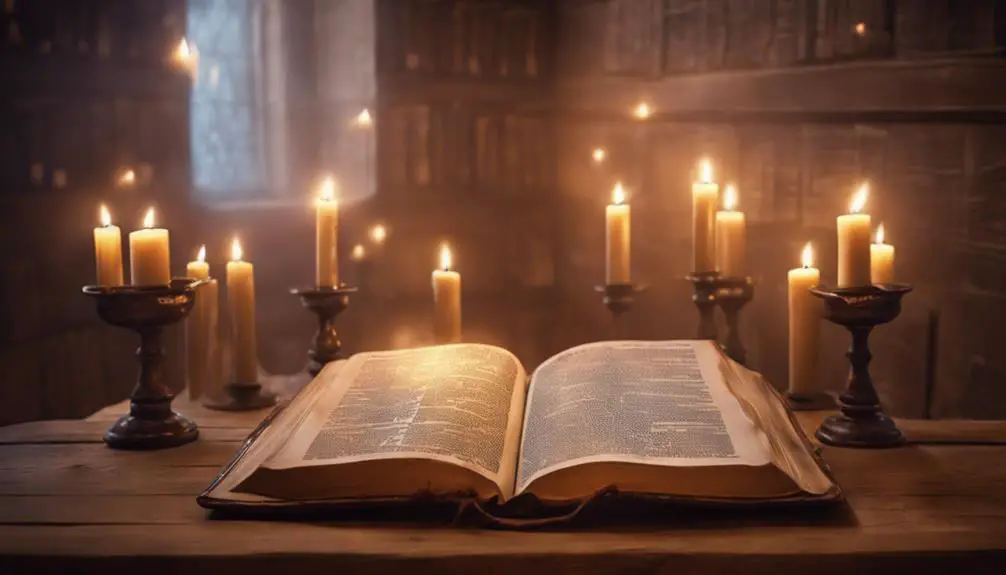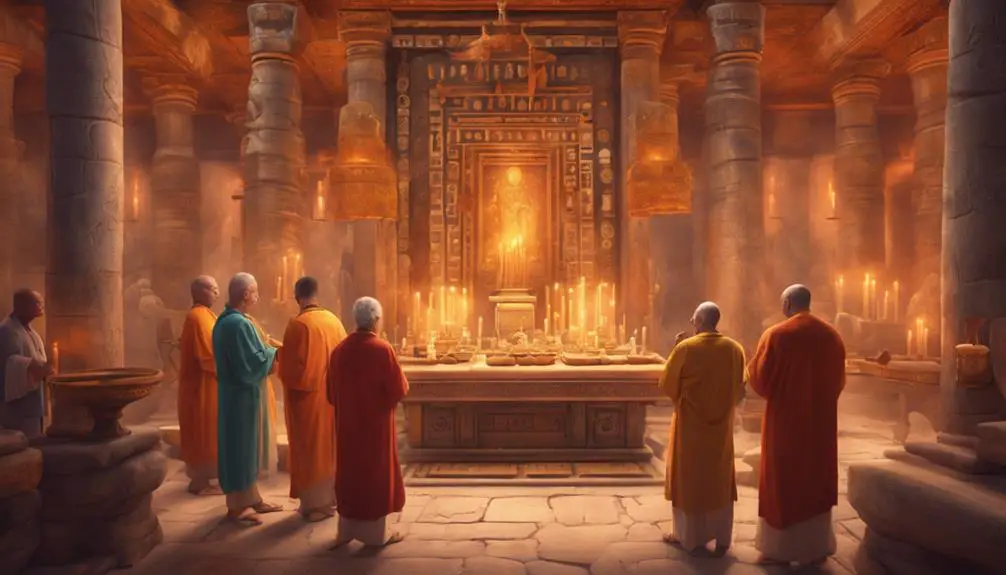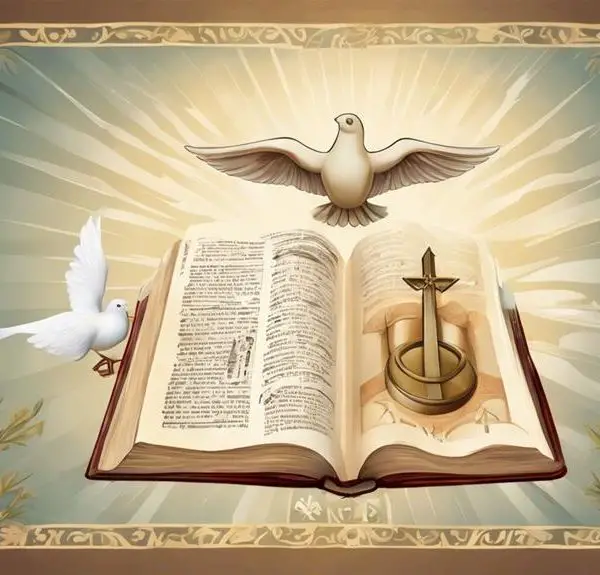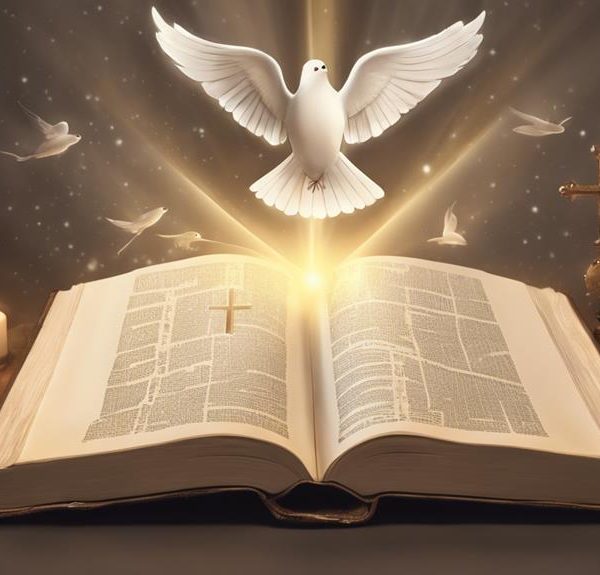Biblical symbolism of the number 24 unveils divine governance and mystery, inviting a deeper exploration of its sacred significance.

24 Meaning in the Bible
As you embark on a journey through the biblical landscape, the number 24 emerges like a beacon, illuminating paths both ancient and mystical. This number isn't just a figure; it's a symbol woven intricately into the fabric of sacred texts, from the 24 elders seated around the throne in Revelation to the division of the priesthood into 24 courses.
Its repetition across various contexts suggests a deeper resonance, one that invites you to explore the layers of meaning and significance that lie beneath. Unraveling the mysteries of 24 could offer insights into the divine structure and governance, a quest that promises to enrich your understanding of biblical numerology and its prophetic undertones.
Key Takeaways
- The number 24 symbolizes completeness and divine order, especially in the context of the 24 elders in Revelation.
- It represents the structured organization of priestly duties in ancient Israelite worship through the 24 Courses of Priests.
- In numerology, 24 carries deep symbolic meanings, reflecting the interconnectedness of physical and spiritual realms.
- The use of 24 in prophetic literature emphasizes the importance of divine messages and the cosmic order in biblical narratives.
The Significance of 24

In biblical context, the number 24 often symbolizes completeness and divine order, particularly seen in the representation of the 24 elders seated around the throne of God in the Book of Revelation. This numerical symbolism extends beyond this specific instance, deeply intertwining with the fabric of creation and divine messaging. The 24-hour cycle, a fundamental aspect of human life and the natural world, mirrors this symbolism, suggesting a divine intention behind the structuring of time. This cycle not only governs the physical aspects of life but also holds spiritual significance, hinting at the completeness and balance inherent in the divine plan.
Furthermore, angelic symbolism associated with the number 24 serves to reinforce this theme of divine order and completeness. In various biblical passages, angelic beings are depicted as messengers and servants of God, who carry out divine will and embody spiritual truths. The association of these angelic beings with the number 24 underscores the harmony and perfection of the divine structure, reflecting a celestial order that resonates with the earthly cycle of day and night. This connection between the number 24, the angelic realm, and the 24-hour cycle offers a profound insight into the interconnectedness of the physical and spiritual worlds, emphasizing the meticulous order that underpins creation.
24 Elders in Revelation
Building on the significance of the number 24, the elders in Revelation epitomize divine governance and spiritual wisdom. These figures aren't merely characters within a narrative; they're deeply symbolic, representing both a continuity with the past and a guidepost for understanding apocalyptic roles within the cosmic order. Their presence in the visionary landscape of Revelation serves as a bridge between the divine and the earthly, mediating complex theological concepts through their actions and attributes.
To further dissect the Elders' symbolism and their apocalyptic roles, let's examine their characteristics and functions in the table below:
Aspect |
Symbolism |
Apocalyptic Role |
|---|---|---|
Crowns of Gold |
Authority & Divine Right |
Governing the New Kingdom |
White Garments |
Purity & Righteousness |
Upholding Spiritual Integrity |
Seated on Thrones |
Judicial Power |
Enforcing Divine Will |
Songs of Worship |
Devotion & Prophecy |
Guiding Believers |
This table encapsulates the multifaceted roles the elders play in the apocalyptic narrative of Revelation. They're not just observers of the divine spectacle but active participants in the unfolding divine plan, embodying principles that guide the faithful through turbulent times and into a new era of spiritual enlightenment and divine governance.
24 Courses of Priests

The Courses of Priests, an integral component of ancient Israelite temple worship, functioned to organize priestly duties and ensure a continuous service to God. This system allowed for the efficient management of temple rituals and the proper use of priestly garments, which were essential for the performance of their sacred tasks.
You'll find that the division into courses wasn't merely administrative but deeply spiritual, reflecting a commitment to uphold the sanctity of worship. Each course had specific responsibilities, ranging from offering sacrifices to maintaining the temple's purity. Priestly garments, detailed in the scriptures, weren't just attire but symbolized holiness and separation unto God. The meticulous care in their design and use underscored the reverence with which the priests approached their service.
Moreover, the organization of these courses facilitated the smooth execution of temple rituals. These rituals, central to Israelite worship, required precision and adherence to divine instructions. The courses ensured that at all times, qualified priests were available to perform these duties, thereby maintaining an unbroken connection between the people and God.
This system highlights the importance of order, dedication, and continuity in worship, principles that resonate beyond the ancient temple to inform contemporary understandings of spiritual service.
Numerology and 24
Exploring the significance of the number 24 in numerology reveals deep symbolic meanings and connections to ancient traditions, including its prominent role in structuring the Courses of Priests. This number doesn't exist in isolation; it's deeply embedded within the fabric of Biblical narrative and Jewish ceremonial law, providing a framework for understanding divine order and harmony.
The number 24 isn't arbitrarily chosen; it reflects a cosmological and societal structure that resonates with the human experience. Consider the division of a day into 24 hours, a cycle that dictates the rhythm of human life. This segmentation into 24 units underscores the importance of balance and regularity, principles that are mirrored in the spiritual and religious domains.
Furthermore, the number 24 holds significance in the context of Jacob's family, representing a foundational element in the establishment of the Israelite tribes. This connection emphasizes the importance of family, heritage, and the divine covenant in Biblical theology.
24 in Prophetic Literature

Shifting our focus to prophetic literature reveals that the symbolic resonance of numbers extends beyond historical and ceremonial contexts, offering insights into the divine messages conveyed by prophets. In this realm, symbolic visions and apocalyptic imagery play crucial roles, serving as mediums through which complex theological and eschatological concepts are communicated. You'll find that prophets often employ vivid imagery and numerology to depict future events, ethical dilemmas, and the ultimate destiny of humanity.
Feature |
Example |
Significance |
|---|---|---|
Symbolic Visions |
Ezekiel's wheels |
Divine presence and intervention |
Apocalyptic Imagery |
Daniel's beasts |
Kingdoms' rise and fall |
Numerology |
Revelation's numbers |
Cosmic order, judgment, and renewal |
Analyzing these elements, you uncover layers of meaning that might not be immediately apparent. Symbolic visions often encode messages of hope, warning, or judgment, while apocalyptic imagery draws the reader into a dramatized narrative of cosmic battles and divine triumphs. Numerology within this literature isn't just arbitrary; it signifies a deeper, divine order and timeline, underscoring the meticulous nature of prophetic messages. Through this analytical lens, you gain a richer understanding of the multifaceted ways prophets communicated their visions and warnings.
Frequently Asked Questions
How Does the Concept of Free Will Align With God's Sovereignty as Depicted in the Bible?
You're diving into deterministic debates and the philosophical implications of free will versus sovereignty. This issue isn't just about choice; it's about how control and freedom coexist.
In discussing this, you're exploring a complex area where determinism and autonomy intersect. It's a scholarly journey to understand how these concepts align or conflict, devoid of specific religious texts but rich in analytical thought.
This exploration offers deep insights into the nature of free will and authority.
In What Ways Does the Bible Address the Issue of Suffering and Evil in the World?
You'll find that the issue of suffering and evil is tackled through narratives of Divine Comfort and Endurance Lessons. These elements offer insights into coping with life's challenges.
Divine Comfort reassures you of a presence beyond the immediate pain, while Endurance Lessons equip you with the resilience needed to navigate adversity.
Together, they provide a framework for understanding and overcoming the hardships encountered, emphasizing growth and support beyond the surface level of suffering.
How Do Different Translations of the Bible Affect the Interpretation of Its Meaning?
Ever wondered how the words you're reading shape your understanding? Different translations of a text can significantly alter its interpretation. Translation techniques and cultural implications play crucial roles in this process.
What Role Do Women Play in the Biblical Narrative, and How Has This Influenced Modern Perspectives on Gender?
You'll find that women play diverse roles in biblical narratives, ranging from leaders to prophets. Their presence and actions have significantly shaped modern views on gender.
Female leadership and prophetic roles underscore their importance and contributions. This historical context challenges and enriches contemporary discussions on gender equality.
Analyzing these narratives offers insightful perspectives on how societal norms and expectations of women's roles have evolved over time.
How Does the Bible's Historical Context Influence Its Teachings on Morality and Ethics?
When exploring how historical context shapes teachings on morality and ethics, it's crucial to consider cultural relativism.
You'll find that archaeological evidence supports the idea that societal norms of the era greatly influenced ethical directives. This understanding allows you to appreciate the Bible's lessons within their original framework, recognizing shifts in moral perspectives over time.
Conclusion
In weaving the tapestry of biblical narrative, the number 24 emerges as a golden thread, symbolizing divine order and completeness. Through the celestial court of 24 elders to the structured service of 24 priestly courses, this number mirrors the heavens' harmony on earth.
In the realm of numerology and prophetic texts, it further deepens our understanding of the divine blueprint. Thus, 24 transcends mere digits, embodying a celestial symphony that echoes through the annals of sacred scripture.



Sign up